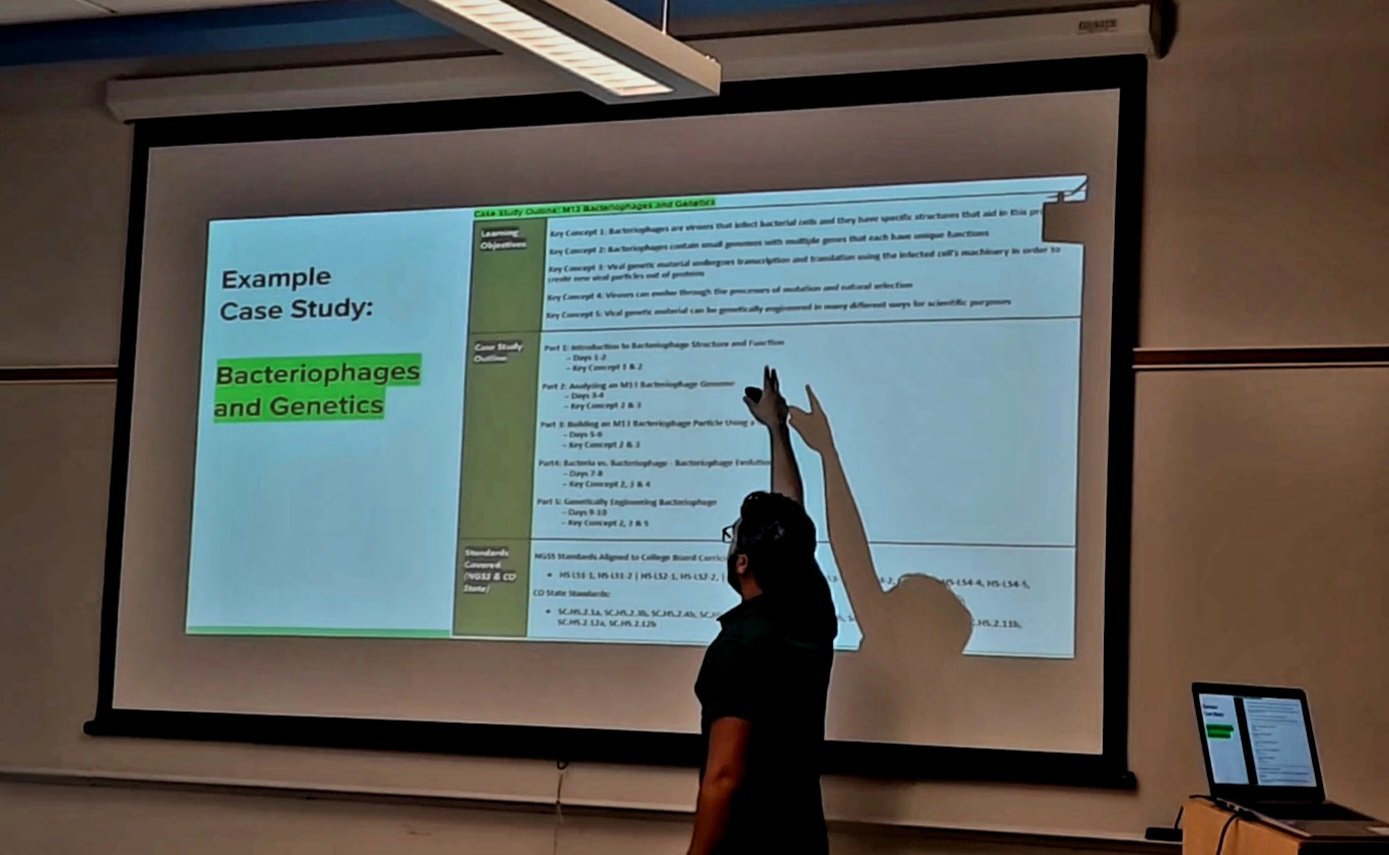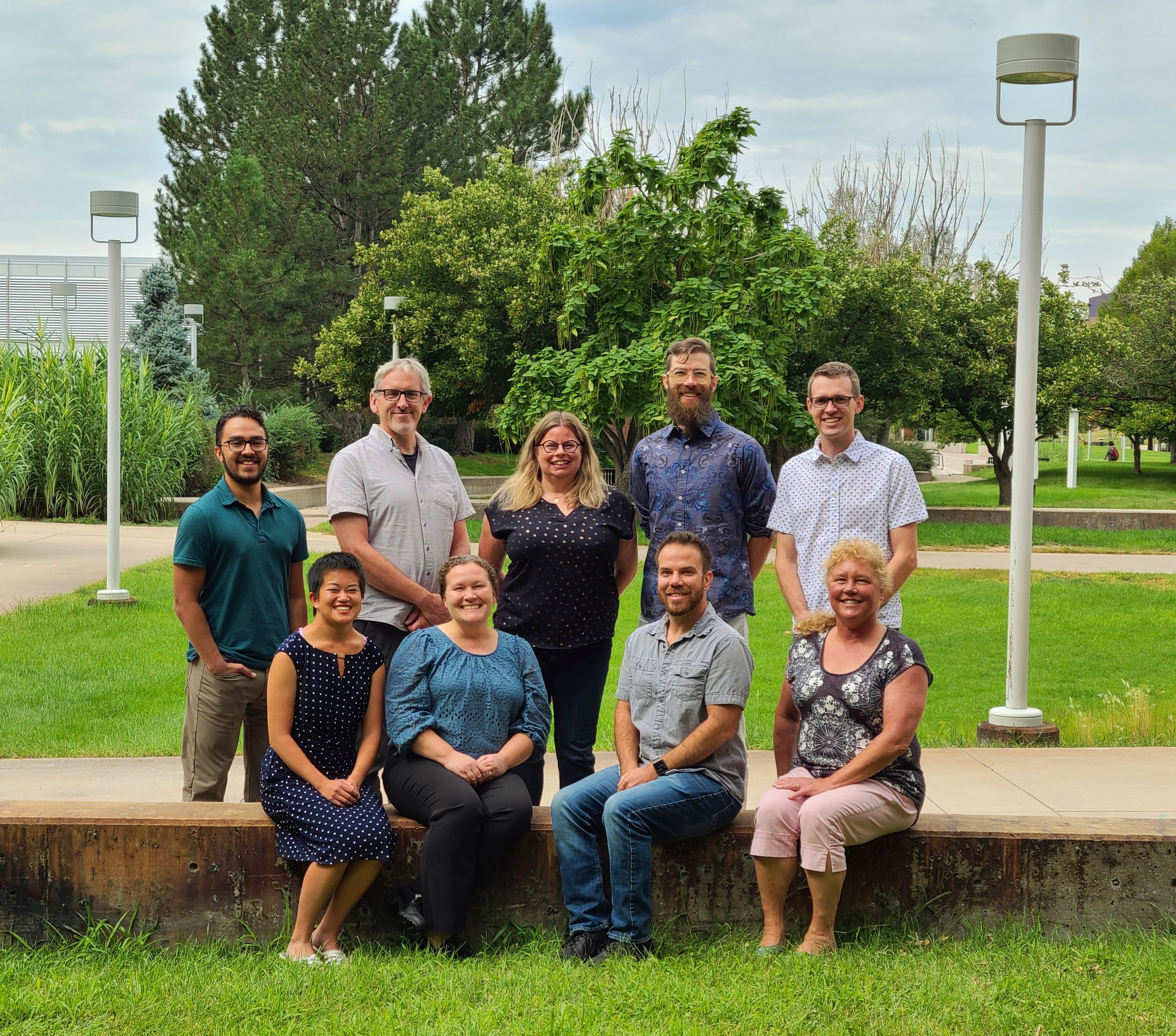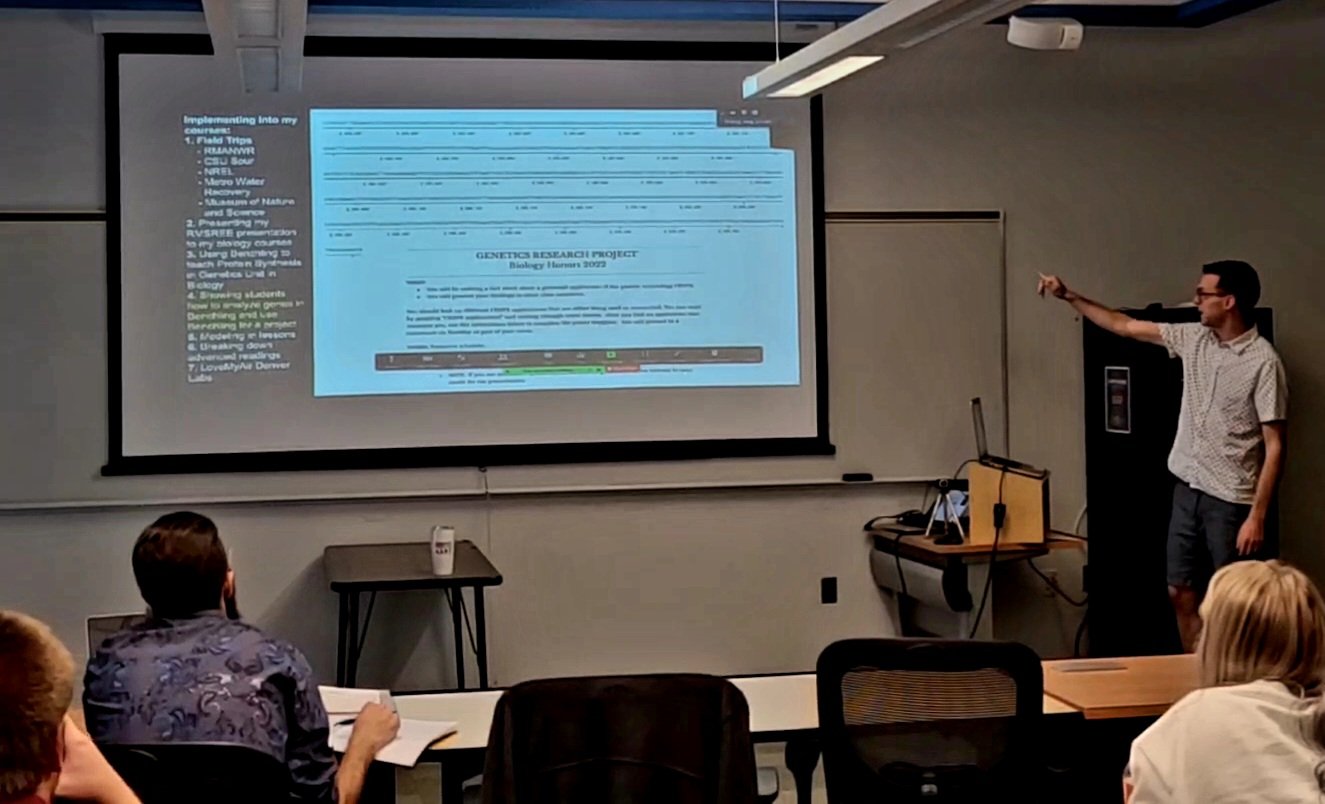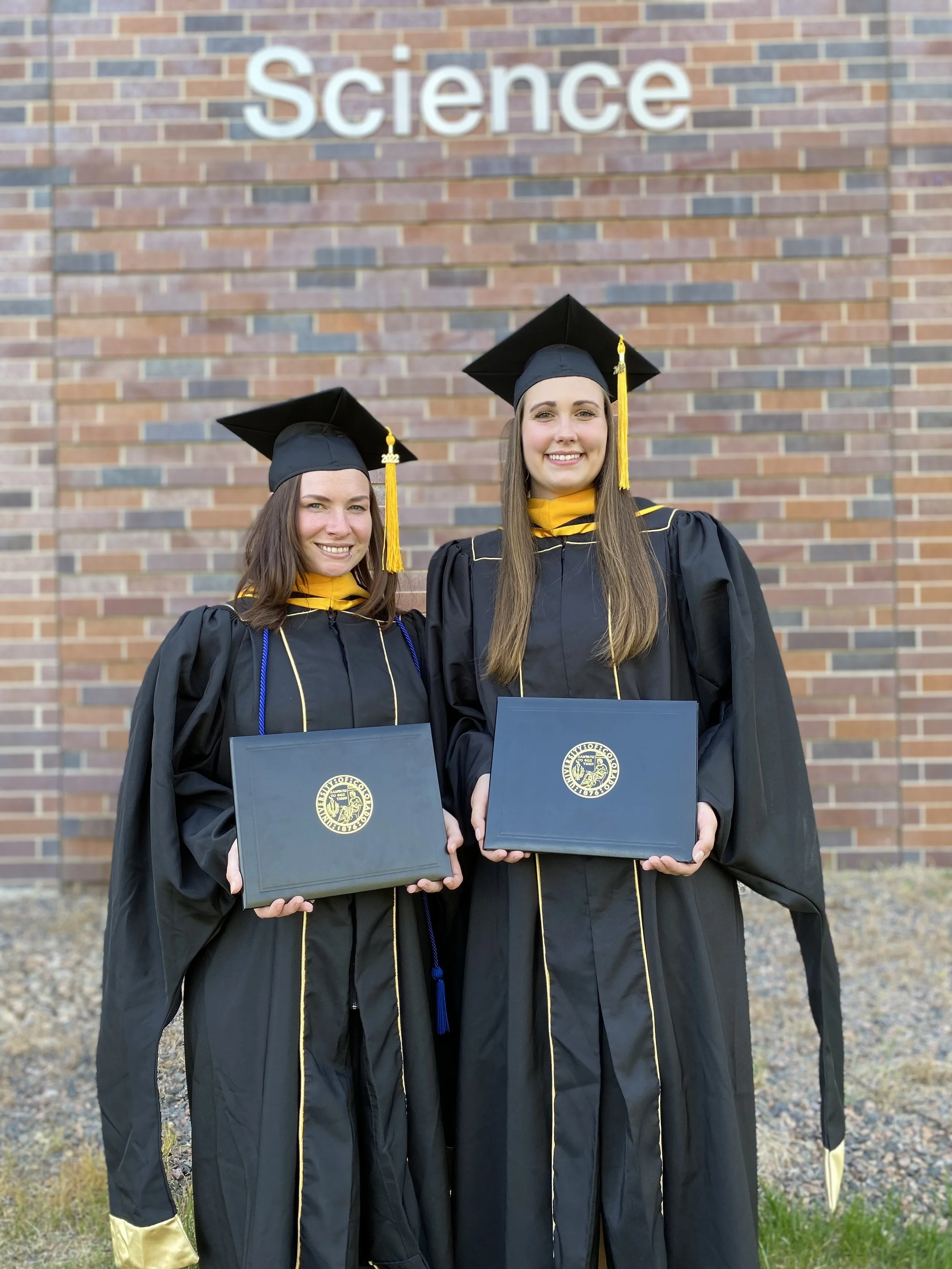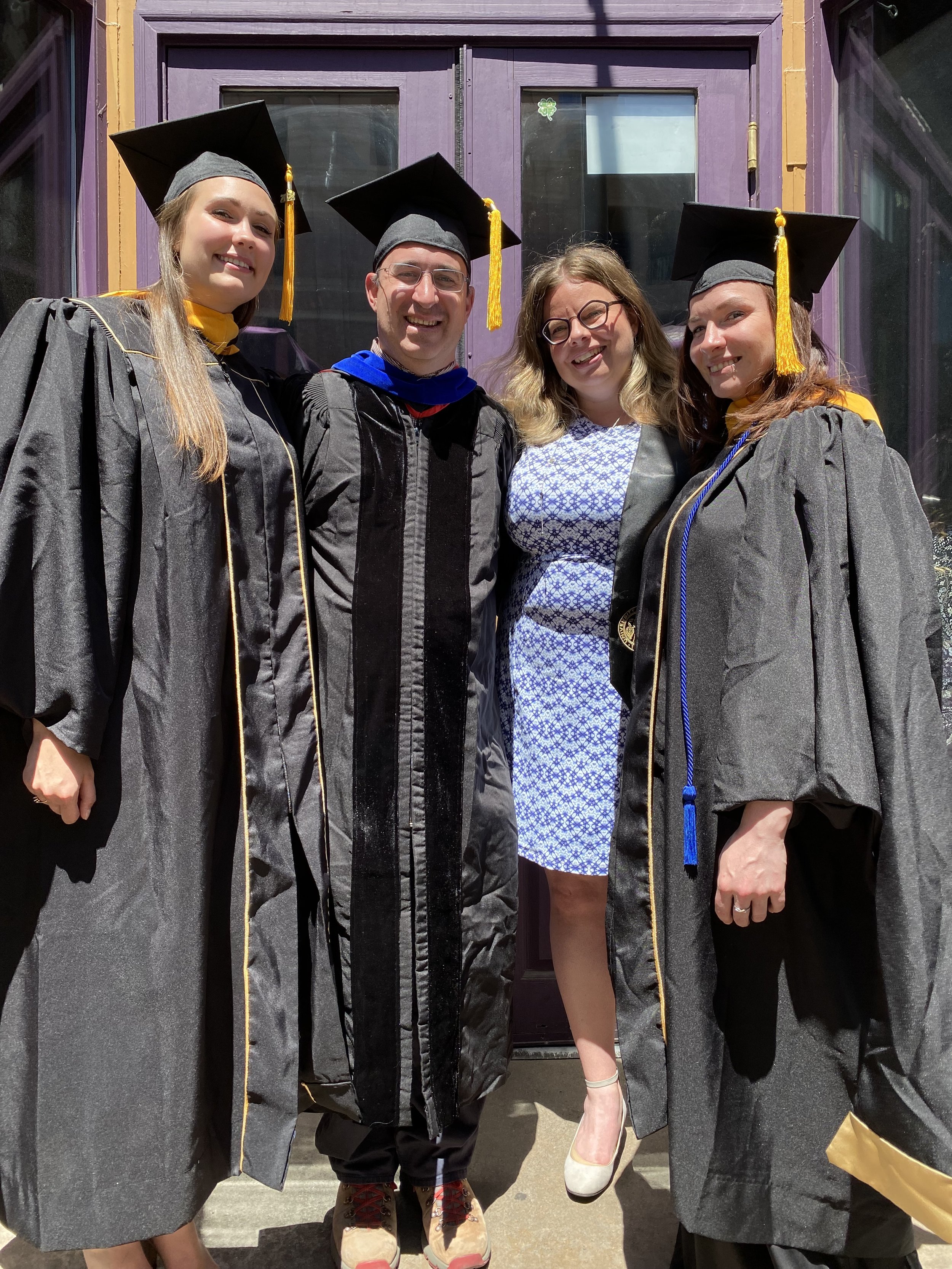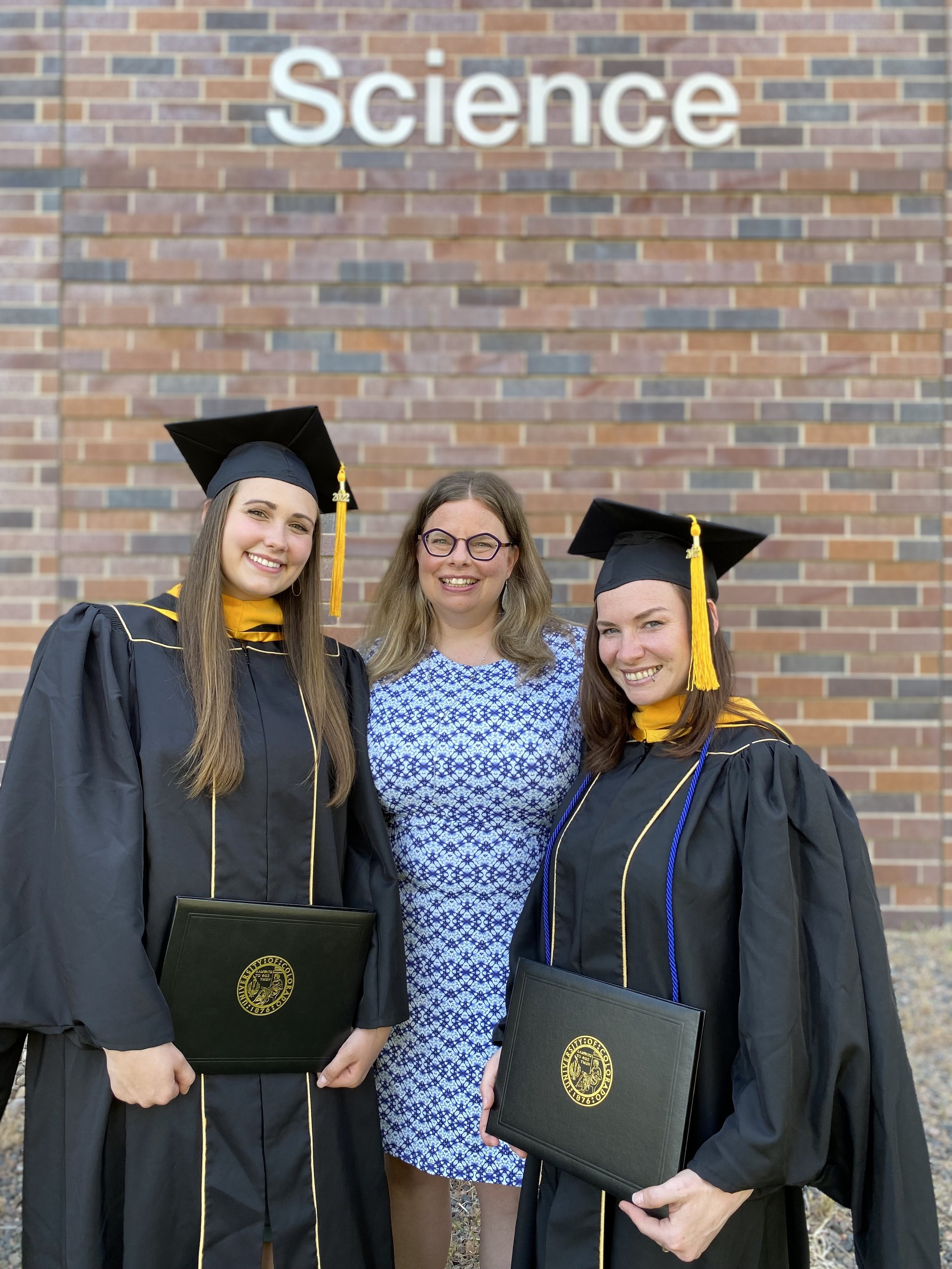Meg Schmitt gives oral presentation at The 13th International Symposium of Aminoacyl-tRNA Synthetases (aaRS 2023)
AARS2023 is an international conference that brings together ~200 scientists from all over the world to advance the frontiers of research with respect to the essential functions of aminoacyl-tRNA synthetases (AARSs) in protein synthesis and translation fidelity and their relationship to disease caused by human pathogens or by genetic mutations in the human population. The research community includes scientists, clinicians, and representatives from the pharmaceutical industry that will meet to reveal new knowledge regarding the origin of genetic coding, the structure and mechanism of the translational apparatus, the diverse roles of AARSs in protein synthesis, as well as non-translational functions and physiological regulation in human disease.
Meg spoke about the lab’s work evolving tyrosine-incorporating versions of orthogonal machinery for rapid evaluation of each orthogonal pair’s ability to reassign a broad range of sense codons, enabling improved quantitative understanding of the factors that influence the fidelity of translation and identifying promising combinations of target codon and orthogonal machinery for incorporation of noncanonical amino acids. Her talk was well received. Great work, Meg!
Nick Vielhauer and Santana Navarrette Give End-of-Summer RMSREE Presentations
On August 20, 2022, Santana and Nick each presented talks synthesizing the entirety of their RMSREE summer and discussing the ways in which they envision aspects of the experience translating to their classroom experience. The talks were given to RMSREE directors, staff, mentors, students from the mentor labs, and other RMSREE participants and friends. We were so thrilled to see the ways in which parts of the experience will shape everyone’s unique classroom settings this coming year.
Nick and Santana: we loved having you in the Fisk Lab this summer. You are an officially part of the Fisk Lab Family and are welcome to use the Official Fisk Lab Pointer (TM) any time. Please don’t be strangers.
Jillyn Tittle receives CU Denver Dept of Integrative Biology Doctoral Teaching Fellowship for 2022-2023
Jillyn Tittle applied for and was awarded a CU Denver Dept of Integrative Biology Integrative and Systems Biology Doctoral Teaching Fellowship for the 2022-2023 academic year. Jillyn will have her first experience as a laboratory TA this year. This fellowship provides ISB doctoral students with additional funds beyond the standard TA position pay. Congratulations. Jillyn!
Alexis Benedis, MS 2022 accepts position at Editas Medicine
In August 2022, Alexis began her new role as Senior Research Associate at Editas Medicine. She’s very excited about her new position. We can’t wait to hear all about it. You’ve got this, Alexis! We’ll miss you!
Fisk Lab Publication!
"Impact of Queuosine Modification of Endogenous E. coli tRNAs on Sense Codon Reassignment"
In this invited contribution to Frontiers in Molecular Biosciences, Protein Biochemistry for Basic and Applied Sciences section and the Special Collection entitled “Exploring and Expanding the Protein Universe with Non-Canonical Amino Acids”, we highlight a relatively unexplored strategy for improving genetic code expansion: alterations to the modifications of endogenous tRNAs to impact their ability to compete against orthogonal tRNAs to decode targeted codons. tRNAs are extensively modified and many of the modifications impact the interactions between tRNA and mRNA in the ribosome. Our first foray into the impact of endogenous tRNA modification on sense codon reassignment by orthogonal pairs involved elimination of the queuosine modification of 4 E. coli tRNAs with QUN anticodons (Q is a modified G). A primary function of queuosine has been suggested to be reduction of the C3 over U3 codon bias of G34 tRNAs. We hypothesized that this inherent bias could be exploited to improve the reassignment of U-ending codons by an introduced orthogonal tRNA with an A34 anticodon. Like so many aspects of protein translation, “it’s complicated”. We found that orthogonal tRNAs with AUN anticodons in queuosine modification-deficient cells exhibit sense codon reassignment efficiences that are slightly improved at Asn AAU, equivalent at His CAU, and less efficient at Asp GAU codons relative to the parent, non-queuosine deficient strain. The report demonstrates the potential utility of alteration to the suite of endogenous organismal tRNAs as handles for improving the performance of introduced orthogonal tRNAs in systems with expanded genetic codes.
Congratulations to Jillyn on her first first author publication! Jillyn picked this project up as an undergraduate researcher during her first semester in the lab as Dave was preparing to head off to his new career in NC. Jillyn immediately jumped in with both feet performing experiments, analyzing the data, and reading tons of background material on the queuosine modification. Wil originally considered queuosine several years ago, and the project was put aside simply because his “project plate” had become overloaded as his research focus shifted. This was truly a team effort! Congratulations to all of the lab members who contributed to this work! Never easy; always worth it.
Welcome to the Lab, Nick Vielhauer and Santana Navarrette
The Fisk Lab is delighted to have 2 Front Range high school STEM teachers in the lab this summer as part of the Rocky Mountain Summer Research Education Experience (RMSREE). RMSREE is an NIH-funded program that enables HS STEM teachers to have a research lab experience for a summer. In addition to working in the lab and learning about the lab’s bacteriophage work and motivations, Nick and Santana will meet weekly with the other HS teachers in different labs and develop course content to take back to their home classrooms.
Fisk Lab Graduations 2022!
The biggest congratulations are in order for two graduate students who successfully defended their MS Thesis in time for the May 2022 Commencement!
Jillyn Tittle began her research career in the final semester of her undergraduate career after Nick was her professor for Honors/Majors Organic Lab II. She began the MS program in Chemistry in Fall 2019, worked through a global pandemic, and moved the Fisk Lab’s efforts to understand protein translation to better engineer systems with expanded genetic codes forward both experimentally and computationally. Jillyn will be continuing her research in the laboratory as she starts the PhD program in Integrative and Systems Biology at CU Denver. We are excited to have her around for a few more years!
Alexis Benedis began her time in the Fisk Lab in Fall 2020, at a time when only 2 individuals were allowed to be working in the Fisk Lab at any given time due to Covid restrictions. She didn’t even meet Nick in person until after her entire 1st year of graduate school. Alexis is a whiz with tempermental instruments and wrangled our FPLC after several years of non-use and set up the lab’s brand new shiny OpenSPR, in addition to her tireless efforts to express and purify an even more tempermental protein. Alexis is actively seeking industrial employment along the Front Range. Now that many more of the lab members are able to work in the lab at the same time, we will be sad to not have her around every day. We’ve gotten so fond of her!
CONGRATULATIONS to Jillyn and Alexis! You are so deserving of your degrees!
Fisk Lab Publication!
In this contribution to Frontiers in Chemistry, Chemical Biology section and the Special Collection entitled “Expansion of the Genetic Code: Unnatural Amino Acids and their Applications”, we show that, using our system (e.g. cell strain, vector choice) for genetic code expansion, orthogonal pair mutations that improvement of reassignment of the Arg AGG sense codon to tyrosine also improve reassignment of the same codon to a noncanonical amino acid when transplanted onto a synthetase that recognizes and aminoacylates a ncAA onto its cognate tRNA. This strategy of rapidly identifying variants using reassignment to a readily screenable amino acid (tyrosine, screenable by FACS) and using the same suite of mutations to improve reassignment to a less readily screenable amino acid (many ncAAs) should be applicable to other sense codons and other orthogonal pairs (provided a variant capable of incorporating tyrosine is identified).
Wil and Dave, the time you spent in the lab working with the ncAAs, protein purification and rounds of FACS were worthwhile. Congratulations on seeing this story come together.
Fisk Lab Publication!
In this International Journal of Molecular Sciences publication, an invited contribution to the special issue “Expanding and Reprogramming the Genetic Code 2.0”, we discuss identification, characterization, and improvement of a variant of the M. barkeri orthogonal tRNA/aaRS pair for the incorporation of tyrosine. Ultimately, we characterize an aaRS variant with efficiency rivaling that of native tRNA/aaRS pairs. We immediately apply the pair in our fluorescence-based screen and show that as was the case with the M. jannaschii pair, every codon targeted could be reassigned simply by altering the anticodon of the tRNA to Watson-Crick base pair with the codon under evaluation. This paper presents the beginning analysis of first author David Schwark’s favorite project from his time in the lab. Stay tuned for the analysis of the reassignment efficiency of more sense codons by this evolved tRNA/aaRS pair.
Congratulations, Dave! This manuscript represents a lot of challenging, detailed, and careful work.
Int. J. Mol. Sci. 2021, 22(2), 895; https://doi.org/10.3390/ijms22020895
Fisk, Knight, and Vugmeyster Labs Awarded Seed Funding from CU Denver for SARS-CoV2 Research
We are excited to work with our colleagues in the Department of Chemistry to identify small, thermostable, tight and specific binding molecules for the SARS-CoV2 surface spike protein using phage display. Together we will express the protein targets and identify and characterize binding molecules. Thank you, CU Denver for helping us initiate this new project and departmental collaboration!
Undergraduate Research Fellowship Awarded for Summer 2020
Congratulations to our undergraduate research associate, Dani Dillon, for being awarded a partial fellowship for her summer research in 2020. Dani is working on furthering our quantitative understanding of the M13 bacteriophage life cycle and her summer effort was spent designing DNA constructs and cloning plans as well as some preliminary investigations of DNA control elements that will be vital for her experimental platform. We can’t wait for you to be back in the lab full time, Dani!
Fisk Lab Publication!
In this ChemBioChem publication, part of the special issue “Xenobiology”, we report additional reassignment efficiencies for 10 rarely used E. coli codons, which allowed a closer examination of the impact of competing tRNA concentration on the efficiency of breaking the degeneracy of the genetic code. We further analyze the newly reported data with all of our previously reported reassignment data for the subset of E. coli wobble codons. Together, these data shed light on fruitful targets for incorporation of non-canonical amino acids as well as the relative quantitative importance of several factors that contribute to the overall fidelity of protein translation. Congratulations to all the authors on this telling of a very complicated story!
ChemBioChem, 2020, 21, 2274-2286.
Undergraduate Research Symposium Poster Presentation
Undergraduate research associates Jillyn Tittle and Christiana Meuret presented the results of their 2nd semester research project in the Fisk Lab at the 2019 CU Denver Research and Creative Activities Symposium (RaCAS) in April 2019. The poster presented their work on sense codon reassignment, and their findings add another piece of data to the Fisk lab’s long-term goals of quantitatively understanding the interplay of the factors that ultimately determine the translation of the genetic code. Look for their names on upcoming Fisk lab publications. Congrats to Jillyn and Christiana on a successful symposium and great work!
Congratulations, Dr. David Schwark
In April 2019, Dr. Schwark accepted a position as a Protein Scientist with Pairwise Plants in Durham, NC. Congratulations, Dave!
Fisk Lab Publication!
In this Genes publication, we discuss utilization of our fluorescence-based screen for codon reassignment to probe sequence context effects on the efficiency of decoding the amber stop codon as a sense codon. We perform evaluate several single stop codon containing GFP variants and several combinations thereof. The suite of measurements if performed in two related cell strains, one of which has had the release factor which reads the amber codon as a stop signal removed. The comparison of reassignment efficiencies between the 2 cell lines allowed us to quantify the contribution of release factor competition to the overall efficiency of stop codon suppression.
We were especially honored to be invited to submit this manuscript to the special issue of Genes on “Synthetic DNA and RNA Programming”
Congratulations to Dave and Meg!
Genes, 2018, vol 9, pg 546
DOI: 10.3390/genes9110546
Speaking Across the Pond
Nick was invited to speak about the lab’s computational model of the M13 life cycle at the First Ever UK Synthetic Biology Congress held in London on November 8 and November 9, 2018. It was a great opportunity to meet some European colleagues and establish new relationships with laboratories that are also interested in understanding and exploiting virus particles and computational modeling to create exciting bio-diagnostics and therapeutics.
Congratulations, Dr. Wil Biddle
In autumn 2018, Wil Biddle accepted a new position of Scientist at KBI Biopharma in Boulder, Colorado.
Funding! NSF Grant Awarded, May 2018!
The National Science Foundation has awarded the Fisk Lab funding to continue our exploration of the quantitative biology of bacteriophage M13! This project is funded by the Division of Molecular and Cellular Biosciences in the Directorate of Biological Sciences and the Systems and Synthetic Biology Cluster.
Building on previous work involving a simulation of M13 growth that integrates 50 years of experimental observations, the goals of this project are to evaluate the nested feedback control loops in the M13 life cycle and fill in gaps in the quantitative understanding of M13 biology. The first objective of the current project involves quantification of the poorly-understood M13 protein-protein and protein-DNA interactions that govern phage DNA replication and the system level response to modifications of the DNA replication program. The second objective involves the identification and quantification of the protein-RNA interactions that regulate the timing and extent of phage protein production. Within this aim the system level effects of modifying the protein-RNA control mechanisms will be investigated. The final objective of the project is to integrate the results of the experiments into the simulation model. This aim will focus on augmenting the model with new quantitative data from Aims 1 and 2, and evaluating the present state of understanding by comparing the results of the system level experiments to predictions. Repeated cycles of theoretical refinement and experimental testing are required to build an engineering design cycle for M13 phage. This proposal will result in a greatly improved quantitative understanding of M13 biology and an infrastructure for the design and production of highly modified particles.
On the road again!
The Fisk lab is thrilled to announce that we have joined the Department of Chemistry at the University of Colorado Denver. We are looking forward to everything this new opportunity offers us, from fantastic facilities to exciting opportunities to collaborate to affiliation with a university that has a medical school. Our move will happen over the summer of 2018, and we will be ready to dive in again in the fall semester.
Congratulations Dr. David Schwark!
Dave Schwark successfully defended his Ph.D. thesis in March 2018! Dave worked on sense codon reassignment in the Fisk lab; one of his most significant contributions was the identification and directed evolution of a variant of the M. barkeri pyrrolysine aaRS that aminoacylates tyrosine. Dave then utilized this orthogonal pair in combination with the fluorescence-based screen for the evaluation of sense codon reassignment at more than 30 codons using the M. barkeri pair. This massive data set is complementary to the evaluation of sense codon reassignment performed using the M. jannaschii orthogonal pair. Together, the 2 suites of data will allow a focused dissection of the relative quantitative importance of the factors affecting the fidelity of translation. Dave's work contributed heavily to the DNA infrastructure for the Fisk lab for future work on both genetic code engineering and non-canonical amino acids understanding protein translation. Dave is currently identifying his next career step and finishing up a few projects in the lab. Congrats and best wishes, Dave!
Fisk Lab Publication!
"Mapping the Plasticity of the Escherichia coli Genetic Code with Orthogonal Pair-Directed Sense Codon Reassignment"
In our Biochemistry manuscript, we discuss 20 new, related genetic codes, in which a targeted E. coli wobble codon is reassigned to tyrosine utilizing the orthogonal tyrosine tRNA/aminoacyl tRNA synthetase pair from Methanocaldococcus jannaschii. One at a time, reassignment of each targeted sense codon to tyrosine is quantified in cells by measuring the fluorescence of GFP variants in which the essential tyrosine residue is encoded by a non-tyrosine codon. Our strategy of using orthogonal tRNA/aminoacyl tRNA synthetase pairs to precisely direct the incorporation of a single amino acid in response to individual sense and nonsense codons provides a suite of related data with which to examine the plasticity of the code.
Congratulations to Meg and Wil!
Biochemistry, 2018, vol 57, pg 2762-2774
DOI: 10.1021/acs.biochem.8b00177
Nick will be speaking at aaRS 2017: The IUBMB Focused Meeting on Aminoacyl tRNA Synthetases!!
Nick Fisk (PI) will be giving a talk on Thursday, November 2, 2017. Come visit Nick on the beach in Clearwater Beach, FL and enjoy some great weather and great science!!!!
Come see us in Vancouver at SEED: Synthetic Biology, Engineering, Evolution, and Design!!
Nick Fisk (PI) will be giving a talk on Wednesday, June 21, 2017 at 2:15 PM entitled "Orthogonal Pair-Directed, Codon Specific Sense Codon Reassignment: An Improved Tool for Evaluating the Plasticity of the E. coli Genetic Code".
Meg Schmitt will present a poster in poster session 1 on Wednesday, June 21, 2017 from 6:00-7:30 PM. You can find her poster "Dissecting the Factors That Determine the Fidelity of the Genetic Code through Sense Codon Reassignment" up in Poster Space 129 starting on Tuesday!
David Schwark will present a poster in poster session 2 on Thursday, June 22, 2017 from 6:00-7:30 PM. You can find his poster "An Engineered Pyrrolysyl tRNA Synthetase for in vivo Measurement of Sense Codon Reassignment in E. coli" up in Poster Space 130 on Thursday and Friday!
We would love to chat with you about this work, and ALL the exciting work happening right now in the Fisk Lab. Come see us!!!!
Congratulations Dr. Wil Biddle!
Wil Biddle successfully defended his Ph.D. thesis in June 2017! Wil worked on sense codon reassignment in the Fisk lab and developed the simple fluorescence-based screen for sense codon reassignment. Wil's work provided a lot of valuable DNA infrastructure for the Fisk lab for future work on both genetic code engineering and non-canonical amino acids and understanding protein translation. Wil is currently deciding on his next steps and finishing up a few projects in the lab. Congrats and best wishes, Wil!
Fisk Lab Publication!
"Hyperthermostable Binding Molecules on Phage: Assay Components for Point-of-Care Diagnostics for Active Tuberculosis Infection"
In our FEBS J manuscript, we described the utilization of the hyperthermostable protein Sso7d as a scaffold for identification of tight specific binding molecules for a variety of protein targets by phage display. Here, we report identification of an Sso7d variant that binds a biomarker for active tuberculosis infection which is secreted in the urine of patients with an active Tb infection. We are working to eliminate antibodies from molecular diagnostics for tuberculosis infection, as the antibody components are often costly and unstable. Binding molecules based on hyperthermostable protein scaffolds, such as Sso7d, could lower the cost of production and improve the physical characteristics of diagnostic devices for use in resource-limited environments.
Congratulations to Ning and Meg for this exciting publication!
Analytical Biochemistry, In press. Accepted December 23, 2016
Fisk Lab Publication Selected as Highlighted Article! January 2017 Virology
"Simulation of the M13 life cycle I: Assembly of a genetically-structures deterministic chemical kinetic simulation"
The editors of Virology selected the first paper on the computational model as a Highlighted Article for the January 2017 issue! This is terrific news and speaks volumes about the detailed difficult work done by Steve, Ronnie and Meg in assembling the model and writing the manuscript. Congratulations to all the authors!!!!!
We'll also be writing an entry for the Virology Highlights blog, which was started to feature Virology's best articles and provide authors an opportunity to elaborate on the back story of their work.
Edit, December 27, 2016: You can read more about our work on the Virology Highlights Blog. Our entry was posted on December 22, 2016.
Fisk Lab Publication!
"Modification of Orthogonal tRNAs: Unexpected Consequences for Sense Codon Reassignment "
In our Biochemistry manuscript describing our simple screen for sense codon reassignment, we reported nearly equal decoding of both histidine codons, CAU and CAC, by an engineered orthogonal M. jannaschii tRNA with an AUG anticodon. We suspected a modification of the tRNA anticodon was responsible for the anomalous lack of codon discrimination. In this manuscript, we demonstrate that adenosine 34 of the orthogonal tRNA with an AUG anticodon is converted to inosine. We identified anticodon loop variants that increase reassignment of the histidine CAU codon, decrease incorporation in response to the histidine CAC codon, and improve cell health and growth profiles. Recognizing tRNA modification as both a potential pitfall and avenue of directed alteration will be important as the field of genetic code engineering continues infiltrate the genetic codes of diverse organisms.
Congratulations to Wil and Meg for this exciting publication!
Nucleic Acids Research, In press. Accepted October 7, 2016DOI: 10.1093/nar/gkw948
Fisk Lab Publications!
"Simulation of the M13 life cycle I: Assembly of a genetically-structures deterministic chemical kinetic simulation" and "Simulation of the M13 life cycle II: Investigation of the control mechanisms of M13 infection and establishment of the carrier state"
A pair of papers on the development and implementation of an in silico simulation of the M13 phage life cycle from infection to release of progeny phage were accepted for back-to-back publication in Virology! These manuscripts represent a great deal of hard work and combing 50 years of research on filamentous phages to assemble as complete a model as is possible with the quantitative data available today.
Congratulations to Steve, Ronnie and Meg for all your hard work on the simulations and preparation of these complex, thorough manuscripts.
DOI: 10.1016/j.virol.2016.08.015 and 10.1016/j.virol.2016.08.017
Genetic Code Engineering 2016
Dr. Fisk and graduate students Wil Biddle and David Schwark attended the first GCE conference in August 2016 at Oregon State University.
All three attendees presented recent Fisk lab research during the poster session.
Wil, Dave and Nick attended a very special tour of the Linus Pauling archives at Oregon State. The tour was a rare experience, as they got to view Pauling's notebooks, original handwritten manuscripts, and correspondence (from back when correspondence *didn't* all happen via email!). They also got to hold both of his original Nobel prizes for Chemistry and Peace! A truly amazing experience at an equally productive conference!
Synthetic Biology: Engineering, Evolution and Design 2016
Dr. Fisk, research scientist Dr. Meg Schmitt, and graduate student Wil Biddle attended SEED 2016 in July 2016 in Chicago, IL.
Dr. Schmitt and Wil Biddle presented recent Fisk lab research during two poster sessions.
Congratulations Dave and Trish!
Graduate student David Schwark married occupational therapist Trish in July 2016. The entire Fisk lab was in attendance. The reception took place in a natural stone amphitheater near Denver. A great time was had by all!
Congratulations Dr. Ning Zhao!
Ning Zhao successfully defended her Ph.D. thesis in June 2016! Ning worked on developing a phage-based biosensor for active tuberculosis infection, which began with an evaluation of a series of alternative scaffold proteins for phage library generation. Ning's work provided a lot of valuable DNA and phage-related infrastructure for the Fisk lab for future work on both improved tuberculosis sensing and other biomarkers of interest. Ning is currently deciding on her next steps and is choosing between several postdoctoral research opportunities. Congrats and best wishes, Ning!
Fisk Lab Publication
"Phage display selection of tight specific binding variants from a hyperthermostable Sso7d scaffold protein library."
Congratulations Ning and Meg!
FEBS J. 2016 Apr;283(7):1351-67. doi: 10.1111/febs.13674. Epub 2016 Mar 6.
American Chemical Society Meeting, Spring 2016
Dr. Fisk was invited to give a talk at the Spring 2016 ACS National Meeting in San Diego, CA. His talk was presented in the Biotechnological Chemistry Division, Biomolecular and Biophysical Processes: Protein Structure and Function section.
Fisk Lab Publication
"Evaluating Sense Codon Reassignment with a Simple Fluorescence Screen"
This manuscript was selected by the Editors of Biochemistry for free open access as an Editors' Choice manuscript. One article per issue is selected for its potential for wide audience interest and scientific impact.
Congratulations Wil and Meg!
Biochemistry, 2015, 54 (50), pp 7355–7364
Funding! NSF Grant Awarded, May 2015!
The National Science Foundation has awarded John Fisk funding to evaluate and improve sense codon reassignment! This project is jointly funded by the Chemistry of Life Processes Program in the Division of Chemistry in the Directorate of Mathematical and Physical Sciences and the Systems and Synthetic Biology Cluster in the Division of Molecular and Cellular Biosciences in the Directorate for Biological Sciences.
Under this award, we will study the expansion of the genetic code through sense codon reassignment. The research project will employ a fluorescence-based screen to measure the extent to which sense codons that naturally read through wobble interactions in E. coli can be reassigned using the orthogonal tRNA/aaRS pairs most commonly employed for nonsense suppression. The same fluorescence screen will be further employed to evolve the tRNA/aaRS systems to better decode reassigned sense codons, to evaluate the plasticity of aminoacyl tRNA synthetase-tRNA recognition domains, and explore the extent to which the machinery of translation can be molded to accommodate expanded genetic codes. The systems identified and optimized to reassign sense codons will be combined to generate genetic codes containing 22 and 23 amino acids. The combined experimental aims of the project provide a host of new measurements to better map the plasticity of the translational system in E. coli and evaluate the degree to which representative tRNA/aaRS pairs can be modified to reassign the meaning of sense codons.
Congratulations Steven Smeal, Masters of Science in Engineering awarded March 2014!
Steve successfully defended his masters' thesis in March 2014. Steve was responsible for developing the computational model of the M13 life cycle for the Fisk lab. His excellent work has enabled many many evaluations of factors that influence the M13 life cycle in a way never possible until 50 years of biochemical data were combined into a single set of differential equations. Thanks for your amazing work, Steve! Congrats and best wishes in your future endeavors!
Funding! Colorado Bioscience Association, Discovery Evaluation grant awarded, November 2012!
The Fisk lab was awarded a Bioscience Discovery Evaluation grant through the Colorado Bioscience Association.
Funding! Dr. Fisk named a Boettcher Foundation, Webb-Waring Biomedical Investigator, July 2011!
Dr. Fisk was selected from young faculty with biomedical research interests across the State of Colorado as 1 of 5 Boettcher Investigators for 2011. The grant from the Boettcher Foundation will allow Fisk to continue the development of bacterial virus particles with a technological utility – specifically improving and expanding on the sensor development project initially funded by the Gates Foundation.
Funding! Infectious Disease Supercluster at Colorado State grant awarded, July 2011!
The Fisk lab was awarded a grant from the IDSC at Colorado State University.
Funding! Bill and Melinda Gates Foundation, Grand Challenges Explorations grant awarded, May 2010!
This award supported the initiation of the Fisk lab's work towards the development of a phage-based sensor for active tuberculosis infection. The sensors involve engineered phage particles that display combinations of binding molecules and sensing molecules in which binding of a protein analyte triggers signal generation.

